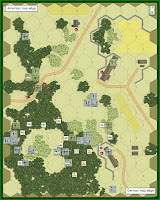Badger was round on Friday. We played Combat Commander, naturally enough, choosing to embark on the campaign scenario from BP#2: Stalingrad. Representing a single September day's fighting atop the Mamayev Kurgan (Badger was pleased to discover that, Stalingrad campaign scenario notwithstanding, there are no city maps), the multigame campaign scenario uses the RSG with a few variants:
- A limited mapset across which to fight; this represents the ebbs and flows of the tactical situation as the battlelines move back and forth across the mountain.
- Predesignated force pools, with named leaders and their platoons replacing the OB's from the RSG.
- Extra rules for fortification resources; for units which survive one scenario becoming reinforcements in the next; and for spreading devestation - a personal favourite this, it adds an increasing amount of rubble to the map each scenario.
We played 2 games; Badger attacking in both. I won the first with a crushing victory; Badger the second, in a much closer run thing. The key to my victory was my willingness to abandon low value forward objectives in favour of exit VP (a feat I managed on each flank). The key to Badger's victory was a secret objective that gave him just enough VP to be able simply to sit back and hold, despite his attacking posture. I'd been wondering why he wasn't attacking, as we both knew he had to; and was berating my stupidity when the revelation of the secret objectives explained all!
The games were played using the RSG RAW, because we didn't want to run them as tests of any variant radio rules. Badger forgot his asset roll in the first game; and failed it in the second, when it might've made a difference (an open map, covered with fortifications and teeming with troops - it'd've been a bloodbath). Even so, I think that this campaign scenario might be grist to the mill of my argument about radios in the CC RSG.
Why? Because the situation represented in the campaign scenario is one in which the attacker and defender postures are local and momentary variations in the overall operational initiative. This I like, because it's authentic. I don't think it's authentic that either side should effectively gain or lose battery access because of these momentary variations. All that said, I can also see how the addition of the campaign scenario to CC might explode some of my objections.
Why? Essentially because the campaign scenario underlines the notion of using 'bidding for posture' as the mechanic which delivers the effect of applying for battery access. That is to say: you get a chance at immediate battery access if you commit yourself to an attack. This I like. I would be happier with it as a system if I hadn't read so much about the defensive use of artillery to break up enemy attacks.
Two years later, on the Western Front
I wrote last month that Badger and I were going to try out some variant RSG radio rules when we played CC that mayday weekend. We did, although we had time for just one game after Mark had left.
Our game took us to 1944, where my German elite rifle company faced off against Badger's detachment of American paratroopers. Bemoaning his paucity of support weapons- the lack of MG's in particular, Badger decided to exercise the variant RSG rules, and took the 81mm radio his support roll offered him.
Faced with this, and with Badger's setup, I pondered quite long and hard my decision about whether or not to make an asset request. I decided not to bother in the end, reasoning that I preferred to keep the extra time I'd been given by Badger's purchase of a radio.
With hindsight, I still think that was a sensible decision. It's just a shame that it was pretty much my last. I mean to say: there I was facing US paras, dug-in in woods, and with an open flank just inviting an envelopment (see setup map, above right). So why, oh why did I decide just to go toe to toe in a firefight in those woods? I'm sure my overwhelming firepower had something to do with it. Unfortunately, I'd forgotten just how intimidating the American assault fire can be when you're trying to get into close combat.
In any event, despite quickly seizing the building on my right, I got bogged down a firefight in the woods. Meanwhile Badger's paras proved exactly as stubborn in defence as you'd expect; on top of which Badger played an exemplary withdrawal (the results of which can be seen left).
The game was fun and full of incident (I lost count of the number of times Badger picked up 4VP because of that damn Command And Control event!). It struck me at the time that it's worth bearing in mind that elite forces are likely to be very active, so that games featuring them are likely to be more eventful than average. Badger won a convincing victory, while I bemoaned the sheer stupidity of my plan.
And as for the variant RSG? I think the new rules were OK. I didn't feel overpowered by Badger's artillery, although that's as much situational as anything else, so is hardly germane. More important IMO: that extra time period? Not only was it something I gained from Badger's decision to purchase a radio; but it was also something important enough to influence my own decision on the matter. I was pleased. More on this soon, I hope. ;)




No comments:
Post a Comment